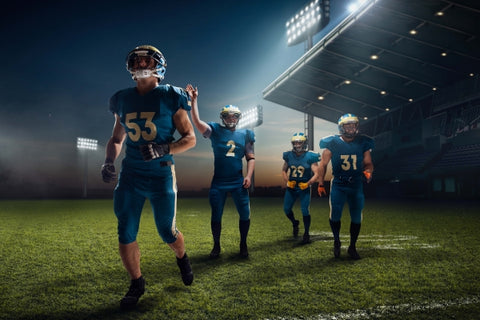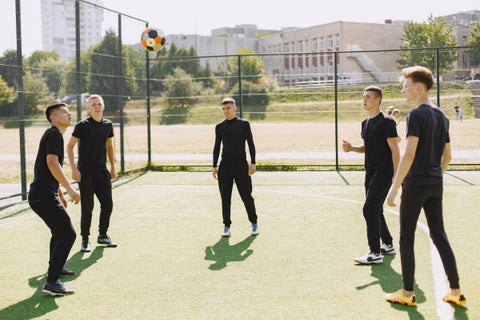Updated December 8, 2022
Let's face it: Being a student-athlete is like playing the game of life in hard mode. You have to balance your studies, practice, and games while somehow managing a social life. Indeed, being an NCAA athlete can be pretty time-consuming! Then there's the physical toll that comes with wearing pads and helmets for hours on end.
So what do NCAA student-athletes get out of all this hard work? Here are some of the benefits college athletes receive:-
Athletic Scholarships
If you are recruited by a college coach and offered a scholarship, it's likely that you'll be able to attend school for free. The vast majority of schools even provide a full scholarship, which includes room and board on top of tuition. In exchange for athletic scholarships from your school, you must meet certain requirements during your time as an athlete. Generally, you must maintain good grades in order to keep your scholarship, so that financial aid will continue until you earn your college degree. On the other hand, partial scholarships are also available at some schools. These can be a great way to help offset the cost of college and minimize student loan debt.
In addition, you also need to participate in activities outside of practice and game days if you want to stay eligible for competition during your four years in college. This includes community service projects, academic seminars, or study sessions with other student-athletes and college students on campus or with coaches and teammates at their homes away from campus.
Not only does being an NCAA student-athlete help pay for college without having to take out student loans, but it also provides opportunities beyond college athletics that can help shape your college experience as well as your future career path. Whether you are gunning for a full-time job in the professional sports industry or in the business world, being a college athlete can give you a huge advantage.

-
Academic Support Services
College athletes represent their schools, compete for conference and national titles, and bring attention to their universities. Apart from that, in college sports, athletes receive a lot of attention from fans and media outlets.
While being a college athlete is an amazing experience, it's important to remember that these student-athletes are students first and foremost. That's why NCAA member colleges offer academic support services to them. These services include tutors, supplemental instruction, and counseling. They help ensure that athletes are on track to finish their college education and still achieve academic success. And here, athletes learn time management skills, to juggle their practice and games with their studies.
You can find out more about academic support services at your school by visiting the NCAA website or contacting your athletic department directly.
-
Medical Services
As a student-athlete, you're likely going to have access to some pretty great medical services. If you're injured and unable to play, you're eligible for medical coverage which includes physical therapy, surgery, and medication. You can also get general health care from your team of doctors like flu shots and sports medicine.
The NCAA covers expenses for all of these things, including travel and housing for the people treating you. You'll also have a chance to get back on the field faster thanks to other types of care like nutrition counseling and chiropractic care.
-
Premium Facilities
As a college athlete, you get access to amazing facilities. You've probably heard of the big-time programs like the University of Alabama and Oklahoma University with their massive weight rooms and top-notch swimming pools — and they are incredible! But even at smaller schools where college sport or the teams may not be as well known, there are still great equipment available for use by the student athletes.
While this is a huge perk for NCAA athletes, it's also a reason why so many people decide to join an NCAA team. Some students don't have a background in athletics or any experience in college sports, but they know that by making a huge commitment to become an NCAA athlete, they'll be able to work out in top-of-the-line facilities every day in order to make themselves stronger, faster, and better prepared even for the life after college.
-
Travel
One of the most appealing parts of being an NCAA athlete is the opportunity to travel. If you’re lucky enough to have a top program with a strong national presence, you could find yourself traveling across the country or around the world! This is especially true for Olympic athletes or those on international teams.
Not only is it a great opportunity to explore different parts of the world and cultures, but it also allows you to build lifelong relationships with other team members and people from different places.
Even if you play for a lesser-known team, there are still plenty of chances for travel. If your college has a rivalry against another college in your state or region, for example, you could see a lot of action on the road. There are also tournaments and competitions that span across the globe. Being able to see different parts of the country and world is one benefit that can’t be matched by any other job!
-
Networking Opportunities
When you're a student athlete, you get to be part of a network that's hard for the average college student to access. Many of your coaches and teammates will go on to become successful in their fields, so you shouldn't just treat them as mentors and friends — you should treat them as potential contacts when you graduate. This is just one of the many benefits of intercollegiate athletics.
And as soon as you start gaining an audience, build that audience by making connections with everyone around you. Reach out to your professors, your classmates, and the people who work in facilities like the library or the athletic training room. You'll be surprised how willing people are to help you out if they know what opportunities may come down the line if they do.
Other college students are also great contacts — even if they're not planning on going into that same field as you, they may have connections with those who are. They might be able to help you get a foot in the door at their place of work or at somewhere else they know well.
Imagine: You could be living in the same dorm with a swimmer who just got back from competing in the Olympics, or your roommate could be a football player who has already been scouted and could sign with an NFL team as soon as he graduates. The friendships built through college athletics can last forever, so make sure you take advantage of this aspect at every opportunity!

-
Valuable Leadership and Teamwork Skills
It's not uncommon to hear that working on a college sports team teaches valuable leadership and teamwork skills. After all, student-athletes are almost beholden to the same standards as Olympic athletes, so they have to communicate with one another effectively, learn time management, maintain a strong work ethic, and perform at their best under immense pressure to achieve a common goal. These are just a few of the many life skills that athletes learn throughout their collegiate athletic careers. After all, intercollegiate athletics can be a real revenue-generating sport.
-
Healthy and Active Lifestyle
It may sound obvious, but one of the best benefits of being a student athlete is that you get to stay in shape. Whether or not your coach has an official exercise program, most athletics teams will expect players to hit the gym or track on their own time and make sure they're keeping up a certain level of physical fitness.
Not only can playing a sport professionally can be a huge motivator to get involved with your school's athletic program, but it also sets a good example for students who are looking to pick up some healthy habits of their own that are beyond the lessons that can be learned in a simple classroom setting.

-
Elite Group of High-Level Competition
Not only are there more opportunities for student-athletes to compete, but the competition is also often the highest it can be. For example, at the Division I level, there are no age limits on who can compete. Because students have more time to develop as competitors before entering college, many Division I athletes are able to reach higher levels of play than amateurs who start playing later in life.
In addition, there are strict rules about eligibility and amateur status to ensure that student-athletes aren't professionalizing while they're still in school. NCAA student-athletes are required to maintain a minimum GPA in order to remain eligible to compete. This ensures that every NCAA student-athlete has a strong academic foundation as well as a competitive one and keeps them focused on pursuing a degree rather than just focusing on winning games or making money.
-
Genuine Love for the Game
Perhaps the biggest benefit of playing college athletics is getting to play your favorite sport in high school for four more years. Not many students get the chance to do so. It doesn't matter if it's football or field hockey; if you love playing a particular college sport, then playing for your college will be one of the most rewarding experiences of your life.

Takeaway
Being an NCAA student-athlete can have its benefits, but it also comes with responsibilities. You'll need to balance your schoolwork with your athletic obligations, and you'll likely be expected to work hard at both, especially if you intend to keep your athletic scholarship. However, if you're willing to put in the time and effort required of NCAA student-athletes, you'll be rewarded with lifelong memories and knowledge gained from competing against some of the best athletes in the world.





